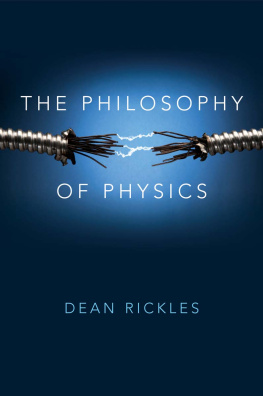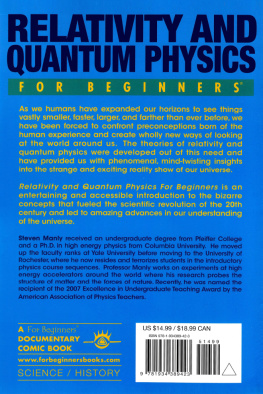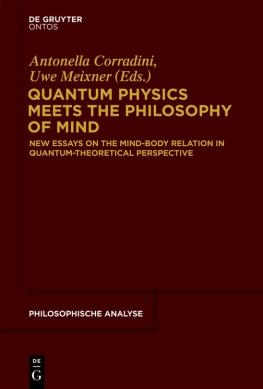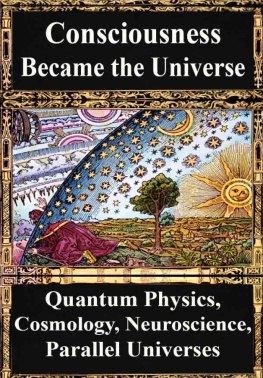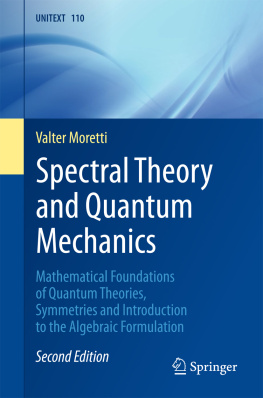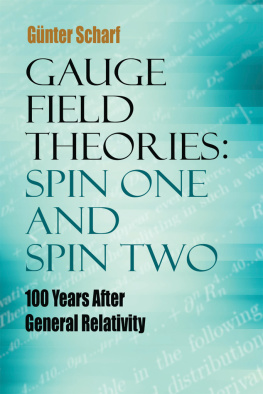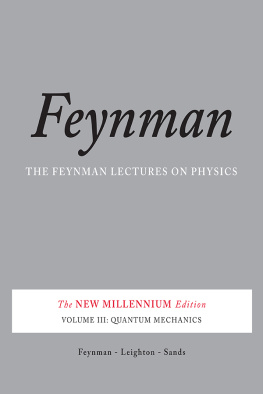Contents
Guide
Pages

To poor little Nora (who always gets left out )
The Philosophy of Physics
DEAN RICKLES
polity
Copyright Dean Rickles 2016
The right of Dean Rickles to be identified as Author of this Work has been asserted in accordance with the UK Copyright, Designs and Patents Act 1988.
First published in 2016 by Polity Press
Polity Press
65 Bridge Street
Cambridge CB2 1UR, UK
Polity Press
350 Main Street
Malden, MA 02148, USA
All rights reserved. Except for the quotation of short passages for the purpose of criticism and review, no part of this publication may be reproduced, stored in a retrieval system, or transmitted, in any form or by any means, electronic, mechanical, photocopying, recording or otherwise, without the prior permission of the publisher.
ISBN-13: 978-1-5095-0940-9
A catalogue record for this book is available from the British Library.
Library of Congress Cataloging-in-Publication Data
Names: Rickles, Dean.
Title: The philosophy of physics / Dean Rickles.
Description: Cambridge : Polity Press, 2016. | Includes bibliographical references and index.
Identifiers: LCCN 2015043550 (print) | LCCN 2015047675 (ebook) | ISBN 9780745669816 (hardback) | ISBN 9780745669823 (pbk.) | ISBN 9781509509393 (Mobi) | ISBN 9781509509409 (Epub)
Subjects: LCSH: Physics--Philosophy.
Classification: LCC QC6 .R4635 2016 (print) | LCC QC6 (ebook) | DDC
530.01--dc23
LC record available at http://lccn.loc.gov/2015043550
The publisher has used its best endeavours to ensure that the URLs for external websites referred to in this book are correct and active at the time of going to press. However, the publisher has no responsibility for the websites and can make no guarantee that a site will remain live or that the content is or will remain appropriate.
Every effort has been made to trace all copyright holders, but if any have been inadvertently overlooked the publisher will be pleased to include any necessary credits in any subsequent reprint or edition.
For further information on Polity, visit our website: politybooks.com
Preface
Philosophical thinking brings with it a heathy dose of skepticism about many things that are often taken for granted. This is generally a good thing and can lead to greater clarity. It can also lead to ideas that look downright bizarre to the general population: the idea that you might be a brain-in-a-vat; the idea that the universe could have come into being five seconds ago; the idea that you are really a spacetime worm stretching from your birth to your death!
In this book we apply the principles of philosophy to theories of physics it is important to emphasize that we are dealing with theories of physics in philosophy of physics: these are the entities that link us to the world and are that which we must interpret. Again, this involves clarity through skepticism, but also leads to views that strike many as odd: the idea that it takes a mind to collapse a quantum state; the idea that there are many worlds (one for each choice in quantum mechanical experiment); the idea that the future can causally influence the present. The good news is that these latter examples are grounded in our best physical theories: odd or not, they seem to offer possible interpretations of these theories (i.e. they are ways the world could be given the truth of the theory). Modern physics can even throw some light on what might be considered purely philosophical issues, such as what is the relationship between an object and its properties?, can two objects share exactly the same properties?, is the future open or fixed?, does time flow?, and are you really a four-dimensional spacetime worm?
There are several books on philosophy of physics that do a very good job at introducing the reader to the basic issues, with varying levels of difficulty. The present book aims to provide a snapshot of the central topics, methods, and problems of modern philosophy of physics in a very elementary manner. The audience for this book is the absolute beginner, albeit one with a modicum of mathematical ability (or an ability to at least not glaze over at the mere sight of some mathematical formulae). But it nonetheless aims to be a complete course, in that it covers all the main areas (classical and quantum, relativistic and non-relativistic, statistical and non-statistical) and provides supplementary readings across a range of skill levels, so indicating the work that needs to be accomplished to reach research-level philosophy of physics.
The book is written for both early stage philosophers and physicists:
- Physicists who want more than rules and algorithms for churning out numbers to compare with experiment, and want to know what it all means.
- Philosophers who want more than watered-down, quasi-journalistic physics, and who are not satisfied with philosophical discussions of the nature of the physical world that do not engage with physics.
Im not going to tell you to shut up and calculate; but Im not going to tell you not to calculate either! A little bit of computational skill is vital in good philosophy of physics, though one could probably be a good physicist without having a philosophical bone in ones body. I would argue, however, that one could not be a great physicist without a good head for philosophical thinking. Despite the necessity of having a good grasp of the mathematical details of physical theories in order to be a proficient philosopher of physics, this book makes do with the bare minimum: it is a stepping stone to the many books of a rather more mathematically involved nature. Where matters get a little technical (or where there are interesting diversions, historical or otherwise), I have relegated these to endnotes these often contain suggestions for interesting, usually more advanced readings.
The book begins, in , with some general considerations about philosophy of physics itself, as a discipline. Central to this is the idea that philosophy of physics concerns itself primarily with interpreting the representations of physical systems that can be found in physics (usually the best available physics, couched in mathematical representations). We also consider the question of why these mathematical representations seem to be so good at gripping onto the world.
, in which we also begin to see how philosophical issues emerge from symmetry symmetry will play a central role in the chapters that follow.
provides tasters of seven more cutting edge issues in philosophy of physics, which might provide more scope for future research projects for budding philosophers of physics.
Each chapter includes a handful of further readings, organized according to difficulty: fun, serious, and connoisseur level. This book should be supplemented with at least the fun readings (or suitable extracts) in order to provide a rounded picture. Together with these, and perhaps several of the readings from the endnotes, this would provide material enough for a semester-long course in introductory philosophy of physics.
I should perhaps end with a brief note on the endnotes in this book: there are lots of them! P. G. Wodehouse mercilessly slammed footnotes in his autobiography Over Seventy: An Autobiography with Digressions (Herbert Jenkins, 1957):
When I read a book I am like someone strolling across a level lawn thinking how jolly it all is, and when I am suddenly confronted with a (1) or a (2) it is as though I had stepped on the teeth of a rake and had the handle spring up and hit me on the bridge of the nose. I stop dead and my eyes flicker and swivel. I tell myself that this time I will not be fooled into looking at the beastly thing, but I always am, and it nearly always maddens me by beginning with the word see.

